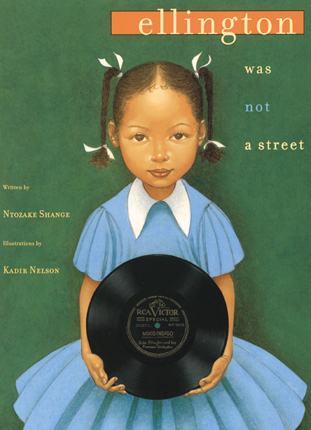Full Text Reviews: Bulletin for the Center... - 03/01/2004 Shange’s poem "Mood Indigo," an adult recollection of a childhood spent "in the company of men/ who changed the world," receives a literal treatment through illustrations that follow a demure little girl who nonchalantly interacts with the mid-twentieth-century African-American luminaries who visit her father. As a freestanding poem addressed to adults, the text is charged with sadness over the passage of a long generation of achievers from activity into memory, and with barely suppressed anger over the shuttering of segments of the African-American community though fear and demographic change. Once "Ellington was not a street," but a vibrant artist, and Shange/narrator remembers when "our windows were not cement or steel/ our doors opened like our daddy’s arms/ held us safe & loved." Snaring and caging intense emotions within a picture-book framework brings the poem to young children’s attention, but the result is problematic: though the pictures are luminous, they limit and constrict the poem, and the featured little girl is too young to capture the interest of those readers old enough to begin to grasp the text’s implications. If the audience does not (or, more likely, cannot) share Shange’s grasp of community evolution, they must be forgiven for simply puzzling over who this little girl is and how her father came to preside over so impressive a salon. Nelson’s domestic scenes are, to be sure, carefully crafted. Opposite the title page, a young lady on a piano bench clutches an old LP; her pensive gaze follows the trajectory of the grand piano lid that bisects a painting of (presumably) Ellington’s orchestra. A later scene of a house party, viewed looking in from streetside, packs an easy-moving, spirited crowd of affectionately caricatured guests into a tight space of precisely centered, bourgeois propriety. A spread of biographical notes introduces these A-list members, but without sufficient historical background, children may unfortunately regard this as little more than an illustrated list of names to know. - Copyright 2004 The Board of Trustees of the University of Illinois. School Library Journal - 01/01/2004 Gr 3-8-Nelson illustrates the noted poet's "Mood Indigo," from her collection entitled A Daughter's Geography. The book begins with the opening lines of the poem set against a pale gray page: "it hasn't always been this way/ellington was not a street." Opposite, a full-page painting shows several people walking beneath a green sign that reads Ellington St. A young African-American woman carrying a red umbrella is prominently featured, and readers will soon understand that she is the child narrator, all grown up (the resemblance is striking). In the poem, Shange recalls her childhood when her family entertained many of the "-men/who changed the world," including Paul Robeson, W.E.B. DuBois, Ray Barretto, Dizzy Gillespie, "Sonny Til" Tilghman, Kwame Nkrumah, and Duke Ellington. Both the words and the rich, nostalgic illustrations are a tribute to these visionaries. Done in oils, the skillfully rendered portraits emphasize facial expressions, clothing, and physical positioning on the page, and provide unmistakable insight into the persona of each individual. Although presented in picture-book format, the poem is sophisticated, and therefore it may need to be read aloud and explained to younger readers. A biographical sketch of each man appears at the end, along with the poem reprinted on a single page.-Mary N. Oluonye, Shaker Heights Public Library, OH Copyright 2003 Reed Business Information. - Copyright 2004 Publishers Weekly, Library Journal and/or School Library Journal used with permission. Booklist - 02/15/2004 The text of this picture book for older children is a paean to Shange's family home and the exciting men who gathered there, everyone from W. E. B. DuBois and Paul Robeson to Dizzy Gillispie and Duke Ellington. Taken from Shange's 1983 poem Mood Indigo, the words here recall, from a child's perspective, what it was like to listen in the company of men / politics as necessary as collards / music even in our dreams. The evocative words are more than matched by Nelson's thrilling, oversize oil paintings, a cross between family photo album and stage set, featuring this group of extraordinary men interacting--playing cards, singing, discussing. The girl who is always watching them is, unfortunately, portrayed as very young, perhaps three or four, although she appears somewhat older on the beguiling jacket art. Preschoolers are not the audience for this, and despite the helpful notes that introduce the men mentioned in the poem, even older children will need further explanations (e.g., where are the famous women?). Depicting the narrator as a child closer in age to the target audience would have helped bridge the gap between a poem written for adults and a book for children. Still, with words and pictures that are so enticing, this will be embraced by many. - Copyright 2004 Booklist. Loading...
|



